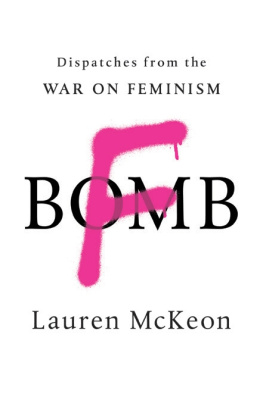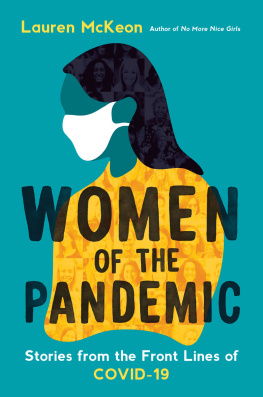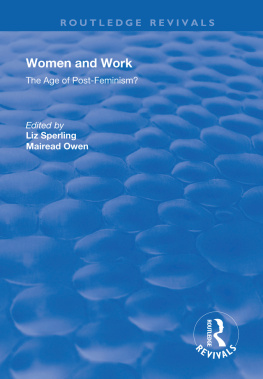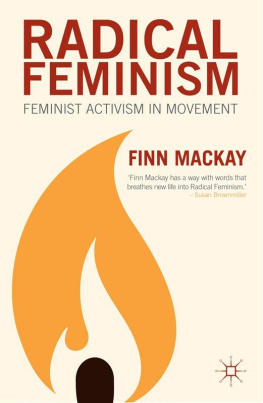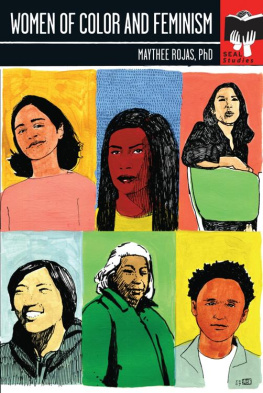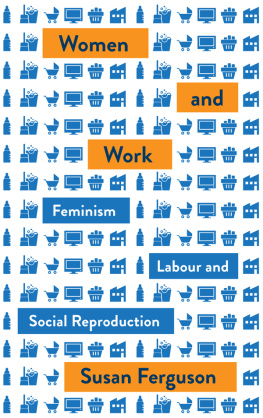F-BOMB

Copyright 2018 by Lauren McKeon
All rights reserved. No part of this book may be used or reproduced in any manner whatsoever without written permission except in the case of brief quotations embodied in critical articles or reviews.

BenBella Books, Inc.
10440 N. Central Expressway, Suite 800
Dallas, TX 75231
www.benbellabooks.com
Send feedback to feedback@benbellabooks.com
First E-Book Edition: March 2018
Names: McKeon, Lauren, author.
Title: F-bomb : dispatches from the war on feminism / Lauren McKeon.
Description: Dallas, TX : BenBella Books, Inc., [2018] | Includes bibliographical references and index.
Identifiers: LCCN 2017047831 (print) | LCCN 2017052368 (ebook) | ISBN 9781946885180 (electronic) | ISBN 9781946885012 (trade paper : alk. paper)
Subjects: LCSH: Feminism. | Anti-feminism.
Classification: LCC HQ1155 (ebook) | LCC HQ1155 .M375 2018 (print) | DDC
305.42dc23
LC record available at https://lccn.loc.gov/2017047831
Edited by Jill Ainsley
Proofread by Lisa Marietta
Front cover design by Oceana Garceau
Full cover design by Sarah Avinger
Spray paint: mr pliskin, iStock.com
Page design by Julie Scriver, Goose Lane Editions
Printed by Lake Book Manufacturing
Distributed to the trade by Two Rivers Distribution, an Ingram brand www.tworiversdistribution.com
Special discounts for bulk sales (minimum of 25 copies) are available.
Please contact Aida Herrera at aida@benbellabooks.com.
Contents
One of the greatest lies of the twenty-first century is that women have made itit being some magical place, a Gloria Steinem-esque take on Walt Disneys Tomorrowland where aspiring and talented girls and women flock to rides like Equal Pay Mountain and Mission to CEO Country. I imagine them munching on Get Out of the Kitchen Funnel Cakes, riding the Reproduction Rights Monorail, or having a blast on the Safe Campus Voyage. Dont forget the Violence-Free Zone, the Carousel of Greatly Lucrative Science, Tech, Engineering, and Math Jobs, and Adventures Thru Respecting You as a Person. Feminist Tomorrowland gift shops sell Wear Whatever the Hell You Want T-shirts and Anti-Slut-Shaming hats. Its the best place on earth. But its all as ridiculous as it sounds.
I was twenty-four and nearly a year into my first big-name magazine gig when I realized Feminist Tomorrowland was very far away indeed. By then, Id already decided I was a feminist. I discovered feminism in my high school gender studies class, slipping into the label as easily as I did my favorite pair of jeans. Id read the word before in books, of course, and on some cellular level the concept called to me. I mean, I signed up for the elective even though I knew most of the school considered it an easy pass. I joined idealistic young teens like me as well as a hulking dude who had a seemingly endless wardrobe of camouflage, at least three stoners who so rarely showed up that I was always surprised when I saw them, and our schools lone Jehovahs Witness, who grimaced through the entire unit on gender and religion. Our teacher was a stalwart, gnomish man whom, at the time, I pegged as eighty, but who was very likely closer to a grizzled sixty. He had a doctoratehe was not Mr. Porter but Dr. Porterand even at sixteen I wondered why he chose to put up with high school kids.
For an old white man, Porters introduction to feminism was admirable. I learned about the history of feminism and sampled the smorgasbord of core feminist theory: impossible beauty standards and the male gaze, the wage gap, the prevalence and cultural normalization of rape and violence against women, and the importance of reproductive rights. My introduction was wicked old skoolas Im only slightly ashamed to admit I would have called it back thenand, I now realize, absent of todays hallmark intersectionality, a term coined by American law professor Kimberl Crenshaw in the late 1980s. Todays feminists use intersectionality to examine and acknowledge the interplay between systems of discrimination and oppressionand as a powerful antidote to white girl feminism. Growing up in a sleepy and not particularly progressive Ontario suburb, I had never even heard the word transgender. For all the courses flaws, though, it set me on the right path, and by university I was already starting to find my own way through the movement, its theories, and its causes. Today, I cant point to just one moment that defines my choice to self-identify as a feminist, but many.
Even in 2008, when I was twenty-four, being a feminist wasnt a popular pick. I knew firsthand that (according to my demographic, at least) cool feminists were a rarity. Id been to many booze-fueled parties where intellectual men and women expounded on the troubles in Afghanistan and the silliness of George W. Bush but received my thoughts on feminism like a fart in the room. A couple of years earlier, Id even published an article about these observations in Chatelaine, a Canadian womens magazine. I argued the single most unattractive thing for a young woman to be was a feminist, akin to gaining twenty pounds overnight. This wishy-washy belief in womens rights, I wrote, was setting us up for a dangerous backslide. Not everybody agreed with me. One woman wrote a letter to the editor that said, in part, I have a traditional role in my home, but I dont see things as unequalI see them as how it is. How will you reach your utopian equality if you are born a woman and someone else is born a man? Its your estrogen against his testosterone. Its biology, baby. McKeon needs to grow up, experience life, and get the chip off her shoulder. Im proud to say Im not a feminist.
And yet it wasnt until this job at a big-name national business magazinemy first one in my chosen fieldthat I discovered how much being a woman mattered. The magazines senior editor didnt seem to like me very much. He was uniformly unimpressed with my writing and never assigned me anything, and whenever I entered his messy office to discuss a story, he demanded I bend over and fetch a stapled report off a stack of teetering paper. He made comments about my shirt, my hair, my shoes, calling my sartorial choices interesting and nice in a tone that heavily implied the contrary. I convinced myself I just needed to work harder to win him over. I was a newbie, after all, and thats how initiation worked. I was a feminist but also a desperate overachiever. I wanted to believe in equality of opportunity. I wanted to believe that girl power meant showing the old curmudgeon he was wrong about me. And so I ignored the lunchtime comments about cunnilingus. I silently recycled the photocopied articles about weight loss, laser eye surgery, and birth control left on my desk each morning.
Then one night at the pub, during a celebration of our recent round of awards nominations (including one for an investigative feature of mine not, unsurprisingly, written for the magazine in question), I finally saw that no amount of trying would get me ahead. The table was crowded and sticky with spilled beer. During a lull in the conversation, the editor turned toward me, the broad slabs of his ruddy cheeks hitched up in a smile. I bet you spend your days crying in a corner, writing poetry nobody will ever read, he said. You should quit now because youll never make it in journalism. As far as insults go it was a weird one, but the message was clear: get out. He laughed and my colleagues laughed while my mouth did its best impression of a Cheerio. He never spoke to me again; it was like Id become a ghost. I quit a few months after that.
Next page
